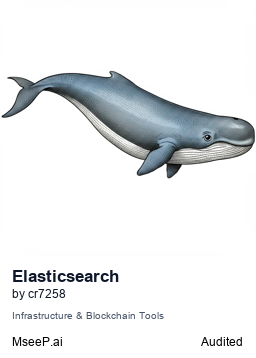A Model Context Protocol (MCP) server implementation that provides Elasticsearch and OpenSearch interaction. This server enables searching documents, analyzing indices, and managing cluster through a set of tools.
elasticsearch-mcp-server-2.mp4
general_api_request: Perform a general HTTP API request. Use this tool for any Elasticsearch/OpenSearch API that does not have a dedicated tool.
list_indices: List all indices.get_index: Returns information (mappings, settings, aliases) about one or more indices.create_index: Create a new index.delete_index: Delete an index.
search_documents: Search for documents.index_document: Creates or updates a document in the index.get_document: Get a document by ID.delete_document: Delete a document by ID.delete_by_query: Deletes documents matching the provided query.
get_cluster_health: Returns basic information about the health of the cluster.get_cluster_stats: Returns high-level overview of cluster statistics.
list_aliases: List all aliases.get_alias: Get alias information for a specific index.put_alias: Create or update an alias for a specific index.delete_alias: Delete an alias for a specific index.
Copy the .env.example file to .env and update the values accordingly.
Start the Elasticsearch/OpenSearch cluster using Docker Compose:
# For Elasticsearch
docker-compose -f docker-compose-elasticsearch.yml up -d
# For OpenSearch
docker-compose -f docker-compose-opensearch.yml up -dThe default Elasticsearch username is elastic and password is test123. The default OpenSearch username is admin and password is admin.
You can access Kibana/OpenSearch Dashboards from
To install Elasticsearch Server for Claude Desktop automatically via
npx -y @smithery/cli install elasticsearch-mcp-server --client claudeUsing uvx will automatically install the package from PyPI, no need to clone the repository locally. Add the following configuration to Claude Desktop's config file claude_desktop_config.json.
// For Elasticsearch
{
"mcpServers": {
"elasticsearch-mcp-server": {
"command": "uvx",
"args": [
"elasticsearch-mcp-server"
],
"env": {
"ELASTICSEARCH_HOSTS": "https://localhost:9200",
"ELASTICSEARCH_USERNAME": "elastic",
"ELASTICSEARCH_PASSWORD": "test123"
}
}
}
}
// For OpenSearch
{
"mcpServers": {
"opensearch-mcp-server": {
"command": "uvx",
"args": [
"opensearch-mcp-server"
],
"env": {
"OPENSEARCH_HOSTS": "https://localhost:9200",
"OPENSEARCH_USERNAME": "admin",
"OPENSEARCH_PASSWORD": "admin"
}
}
}
}Using uv requires cloning the repository locally and specifying the path to the source code. Add the following configuration to Claude Desktop's config file claude_desktop_config.json.
// For Elasticsearch
{
"mcpServers": {
"elasticsearch-mcp-server": {
"command": "uv",
"args": [
"--directory",
"path/to/src/elasticsearch_mcp_server",
"run",
"elasticsearch-mcp-server"
],
"env": {
"ELASTICSEARCH_HOSTS": "https://localhost:9200",
"ELASTICSEARCH_USERNAME": "elastic",
"ELASTICSEARCH_PASSWORD": "test123"
}
}
}
}
// For OpenSearch
{
"mcpServers": {
"opensearch-mcp-server": {
"command": "uv",
"args": [
"--directory",
"path/to/src/elasticsearch_mcp_server",
"run",
"opensearch-mcp-server"
],
"env": {
"OPENSEARCH_HOSTS": "https://localhost:9200",
"OPENSEARCH_USERNAME": "admin",
"OPENSEARCH_PASSWORD": "admin"
}
}
}
}- On macOS:
~/Library/Application Support/Claude/claude_desktop_config.json - On Windows:
%APPDATA%/Claude/claude_desktop_config.json
Restart Claude Desktop to load the new MCP server.
Now you can interact with your Elasticsearch/OpenSearch cluster through Claude using natural language commands like:
- "List all indices in the cluster"
- "How old is the student Bob?"
- "Show me the cluster health status"
uv run mcp_client/client.py src/server.pyThis project is licensed under the Apache License Version 2.0 - see the LICENSE file for details.
